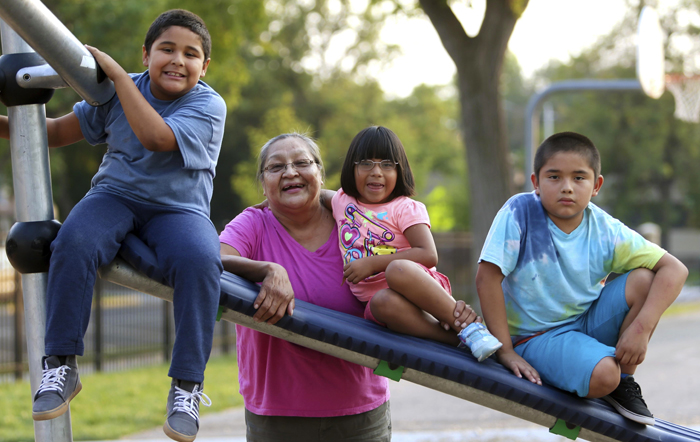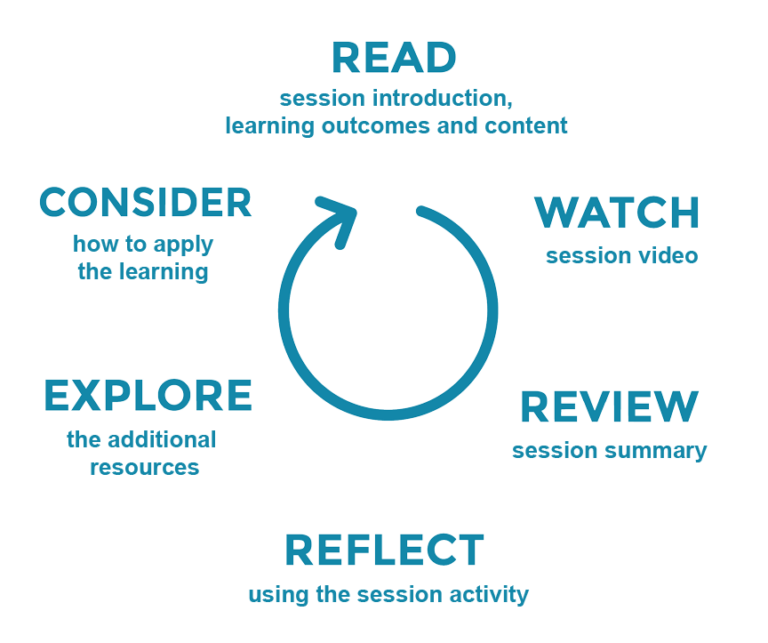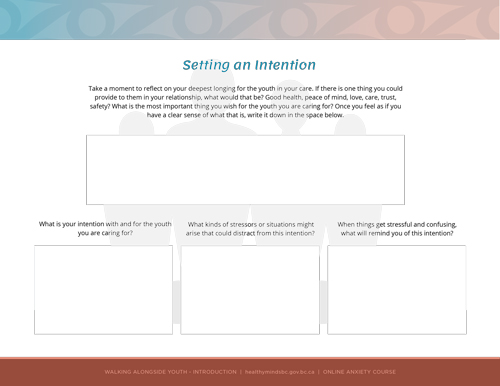Walking Alongside Youth with Anxiety
ONLINE COURSE
Supporting you to walk alongside youth with anxiety
A warm welcome
We are so glad you have found your way to Walking Alongside Youth (WAY). This online course was created specifically to meet the unique needs and experiences of foster care providers and out-of-care care providers throughout British Columbia who are caring for youth with anxiety.
WAY was developed with careful consideration of the needs of Indigenous youth and families, who come from a rich diversity of traditional knowledges and practices that can guide culturally informed and safe responses to anxiety. This is a trauma– and evidence-informed course, intended to empower you with insight and practical, culturally safe ways of responding to youth with anxiety.
WAY is intended to create a sense of walking together in relationship, side by side, in a supportive and respectful way. The focus is on strengthening the relationship between you—as a caregiver or care provider—and the youth in your care, by bringing together and drawing from best practices on well-being from Indigenous and Western knowledge systems. WAY recognizes and focuses on relationship as a universal, cross-cultural necessity for all peoples and across all generations. Walking alongside one another in relationship provides the most natural opportunity for healing and growth to unfold.
As you engage with this course, we walk alongside you, supporting and encouraging you along the way. We hope you find the courage and strength you need to continue this important journey and to walk alongside the youth in your care.
About WAY
WAY was developed to:
- blend holistic, traditional Indigenous perspectives with established, contemporary scientific knowledges to support practical, culturally safe ways of caring for youth with anxiety who are living in foster care and out-of-care arrangements
- support caregivers and care providers of youth experiencing anxiety to respond by focusing on relationship and culturally affirming approaches
- give caregivers, care providers and kin a deeper understanding of the signs and symptoms of anxiety so they can respond with confidence
- respond with confidence to youth, in ways that are relational and that support well-being
- provide an inside-out understanding of anxiety that youth living in foster and out-of-care arrangements—who have likely experienced wounding in their relationships and felt unsafe—often experience, and the benefits of indirect approaches to easing anxiety that focus on strengthened relationships


How the course is structured
WAY is a collection of anxiety literacy resources in seven sessions:
1. Understanding Youth with Anxiety
2. Four Relational, Culturally Safe Approaches
3. Honouring Identity, Experiences and Family Traditions
4. Nourishing Youth with Anxiety through Relationship
5. Reducing Experiences That Fuel Anxiety
6. Restoring Conditions That Lead to Wellness, Resilience and Growth
7. Putting It All Into Practice
Each session is intended to build on the preceding session, guiding you in strengthening relationships, responding to youth in culturally safe and practical ways, and understanding that walking alongside the youth in your care is the first step to addressing their symptoms of anxiety. Each session includes:
- text, including PowerPoint slides that can be downloaded and printed
- a short video featuring parents, care providers, youth, Elders, Knowledge Keepers and others sharing stories and teachings relevant to the session
- learning activities
- more resources, such as infographics and links to other material (e.g., articles)
- opportunities to check your knowledge and reflect on what you’ve learned
Each session should take you about 20 minutes to complete. On completing all of the sessions, you will receive a certificate of completion to use as proof of learning. You will also be able to download a list of additional resources that you may find helpful, as well as a reference list for the sources mentioned in the course.
How the course was developed
The Ministry of Children and Family Development’s Aboriginal Policy and Practice Framework (2013) outlines a respectful and collaborative process, referred to as “Gathering the Circle,” which has guided the development of all aspects of WAY. Gathering the Circle ensures that the foundations and values of Indigenous Peoples are considered and kept at the centre by:
- learning who needs to be involved from the family and community, including Elders and traditional knowledge keepers
- building respectful and listening relationships with those who are to be involved
- gathering those who must be involved, in a culturally safe manner and setting
- seeking understanding about the cultural and community context of the matter and how that should guide decisions and actions
- viewing the matter from a perspective that considers spiritual, mental, emotional and physical dimensions
- considering strengths that can be built upon and how to take proactive steps
Recognizing the historical and ongoing impacts of colonization and intergenerational trauma on Indigenous families and communities, and the immediate need for culturally distinct approaches, WAY was developed collaboratively with Indigenous Peoples and communities throughout British Columbia. We have Gathered the Circle by forming a community-based advisory group made up of parents, caregivers, practitioners and youth.
How to get the most out of the course
We invite you to keep the relationship with the youth in your care at the forefront of both your mind and your heart while completing WAY.
Taking time between sessions to sit with, reflect, absorb and understand the teachings in each session is highly recommended. Time for reflection will help deepen your understanding and increase your sense of confidence in applying what you have learned in meaningful and mindful ways. Building on the previous sessions, each session is intended to provide practical insights that will develop your capacity for walking alongside youth with anxiety.
- Keep the youth in your care at the forefront of both your mind and heart throughout the sessions.
- Set an intention for your youth and lead with this intention as you navigate each session.
- Don’t rush. Take your time and take breaks between each session to reflect on what you have read, heard, felt and thought about.
- Try to be patient with yourself. Resist the temptation to go into problem-solving mode and trust that the insights will emerge from within you throughout the learning process.
- Remember that anxiety is not a problem to be solved. It is something that needs relational support.
- Imagine yourself walking alongside your youth and alongside anxiety.
How to proceed through WAY

Setting an intention
Take a moment to reflect on what it is you want most for the youth in your care. If there is one thing you could provide to them in your relationship, what would that be? Good health, peace of mind, love, care, trust, safety? What is your most important wish for the youth you are caring for? Once you have a clear sense of what that is, write it down in the space below.
Write your answers to the questions on the fillable/downloadable activity and save:
- What is your intention for the youth you are caring for?
- What kinds of stressors or situations might arise that could distract you from this intention?
- When things get stressful and confusing, what will remind you of this intention?

Intentions are powerful. When we set them, they tend to guide our actions and responses. During times of stress, intentions can bring us back to and remind us of what is most important. Intentions help chart a course for where we want to go. Without them, we can easily lose our way.
Goal setting and writing down intentions decreases stress and increases feelings of well-being. We are more likely to achieve our goals when we write them down.
